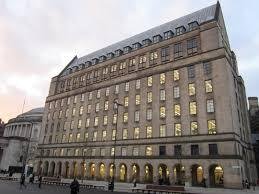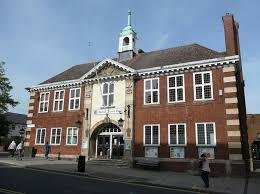What historic building in Manchester played a major role in shaping the city’s democratic institutions?

Manchester has a significant historical significance when talking about the development of democracy in Britain. Manchester, dubbed the “Cradle of the Industrial Revolution,” was the origin of democratic ideals, social activity, and political reform in addition to being a hub for economic and technological advancement.
Manchester Town Hall stands out among its many historic buildings as a pillar of these democratic advancements. For more than a century, Manchester’s political, civic, and social development has been symbolised and staged by this magnificent neo-Gothic masterpiece situated in Albert Square.
This architectural treasure from the 19th century is much more than just a municipal structure; it is a living testament to democracy, where concepts of representation, government, and public service have influenced Manchester’s current identity.
1. The Historical Background: The Democratic Awakening in Manchester
Manchester expanded quickly from a small market town to an industrial city during the 18th and 19th centuries. The city’s factories, ironworks, and cotton mills, which drew thousands of workers from all across Britain and Ireland, served as the catalyst for the Industrial Revolution.
However, as industry expanded, there were significant socioeconomic disparities. Workers suffered from poor pay, unfavourable working conditions, and a lack of political representation. Manchester developed as a centre for reform movements calling for universal suffrage, labour rights, and just governance.
Public indignation was heightened and national discussions about democracy were sparked by incidents like the Peterloo Massacre of 1819, in which peaceful demonstrators demanding the right to vote were attacked by cavalry in St Peter’s Field.
Manchester Town Hall was created in this setting, a city moulded by both political conflict and industrial advancement.
The Town Hall would eventually come to embody the people’s voice and a new era in which everyone could participate in municipal decision-making.
2. Manchester Town Hall: A Representation of Democracy and Civic Pride
Completed in 1877, Manchester Town Hall is a magnificent example of Victorian aspirations and civic duty. The edifice, which was designed by the well-known architect Alfred Waterhouse, was meant to highlight Manchester’s independence, wealth, and intelligence.

Constructed in the Neo-Gothic style, it mirrors the opulence of mediaeval cathedrals, but for the worship of civic virtue and democracy rather than religion. The Town Hall was intended to serve as a “cathedral of municipal power” where people could convene, discuss, and decide on matters pertaining to the general welfare.
Its imposing clock tower, which can be seen from all over the city, represents the dependability and openness of local government. Manchester’s democratic ethos is aptly captured by the phrase engraved on its walls: “Concilio et Labore” (By Counsel and Work).
3. Symbolism and Architecture: Stone Democracy
Manchester Town Hall’s architecture is more than just ornamental; it conveys a narrative. Every aspect of its design embodies the principles of liberty, advancement, and involvement.
Exterior Grandeur: Inspired by mediaeval guildhalls and universities, the spire-like clock tower, elaborate carvings, and towering Gothic arches represent civic wisdom, learning, and unity.
The Great Hall: Twelve enormous murals by artist Ford Madox Brown line the Great Hall, the Town Hall’s most recognisable interior area. These murals represent themes of innovation, trade, education, and change as they trace Manchester’s history from the Roman era to the Industrial Revolution.

Each mural is an artistic tribute to Manchester’s citizens and reformers who shaped not just the city, but the democratic fabric of Britain.
The Council Chamber:
This chamber served as the heart of the city’s government, where elected representatives gathered to discuss policies and make decisions that impacted Manchester’s people. The chamber’s design, with its circular layout, evokes equality and dialogue — a space where every voice could be heard.
4. The Town Hall’s Contribution to Manchester’s Democratic Development
Manchester Town Hall has been a centre for civic discourse, public participation, and social advancement since its founding.
a. Local Governance’s Ascent
Manchester emerged as an example of municipal democracy in the late 19th century when cities obtained greater administrative autonomy. Progressive initiatives, ranging from bettering housing and sanitation to promoting public health and education, were implemented at Town Hall.
Local leaders in this area spearheaded reforms that subsequently influenced national policies. In keeping with the democratic ideal of serving the people, Manchester’s city government was among the first to provide free public libraries, affordable housing, and organised labour rights.
b. A Reformer’s Platform
Numerous lectures, demonstrations, and gatherings by reformers, activists, and political personalities supporting social justice, women’s suffrage, and workers’ rights were held in Town Hall.
Notably, Manchester’s democratic heritage, which was fostered in the Town Hall’s chambers and the surrounding streets, served as an inspiration to Emmeline Pankhurst, the suffragette who founded the Women’s Social and Political Union (WSPU).
c. Public Representation and Civic Ceremonies
The edifice has hosted civic honours, council inaugurations, and public celebrations for many generations. The intimate bond between Manchester’s administration and its citizens, a hallmark of democratic governance, is symbolised by these rituals.
5. The Town Hall and the Public Protest Movement
Manchester Town Hall has historically served as an emotive hub for protest and expression outside of its formal function.

The building’s location, Albert Square, has served as a hub for protests and popular movements throughout history. The Town Hall has seen Manchester’s ongoing struggle for justice, from labour demonstrations in the 19th century to anti-war demonstrations and climate strikes in the 21st.
6. Today’s Town Hall: Conservation and Revitalisation
Manchester Town Hall closed in 2018 for the Our Town Hall Project, a comprehensive renovation project, after more than 140 years of service to the community.
The goal of this massive project, which is anticipated to be finished in 2025, is to update the structure for contemporary civic usage while maintaining its historic magnificence.
The focus of the restoration is:
preserving historical elements, such as woodwork, sculptures, and murals.
improving public access so that visitors and residents can learn about its democratic heritage.
establishing new exhibition venues that convey Manchester’s narrative of governance and social transformation.
The Town Hall will once more function as a living museum of democracy upon its reopening, bridging the gap between previous reform movements and upcoming generations.
7. Additional Democratic Landmarks Associated with Town Hall
The impact of the Town Hall goes beyond its boundaries. It is a component of a larger civic environment that honours Manchester’s democratic journey:
The Peterloo Memorial, which honours those who lost their lives fighting for the right to vote, is located in St. Peter’s Square, the location of the Peterloo Massacre.
Nearby is the People’s History Museum, which keeps banners, leaflets, and narratives about Britain’s democratic struggle.
The Pankhurst Centre is committed to the women’s suffrage movement, carrying on the struggle for empowerment and equality.
The Abraham Lincoln Statue in Lincoln Square represents Manchester’s support for international human rights concerns, especially the fight against slavery.
8. Significance and Legacy
Manchester Town Hall is a representation of the power of the people, not just a marvel of architecture. It represents the transition from industrial struggle to civic advancement, from oppression to representation.
Three major topics can be used to understand its influence on democratic institutions:
Representation: It gave people a way to choose and hold their local leaders responsible.
Participation: It developed into a public forum for discussion, disagreement, and dissent—all of which are essential to democracy.
Reform: It represented progressive governance, making sure that the demands of families, workers, and the underprivileged were taken into consideration.
Reformers, historians, and tourists who view the Town Hall as a testament to social fairness and civic integrity are still motivated by it today.
In conclusion
Manchester Town Hall is the proud response to the question, “What historic building in Manchester played a major role in shaping the city’s democratic institutions?”
It is more than just a remnant of Victorian architecture; it is a live example of the development of democracy, where principles of justice, equality, and representation were discussed, upheld, and promoted.
This magnificent structure has been the centre of Manchester’s political life for more than a century, from suffragette demonstrations and reform petitions to city council meetings that have shaped contemporary governance.
